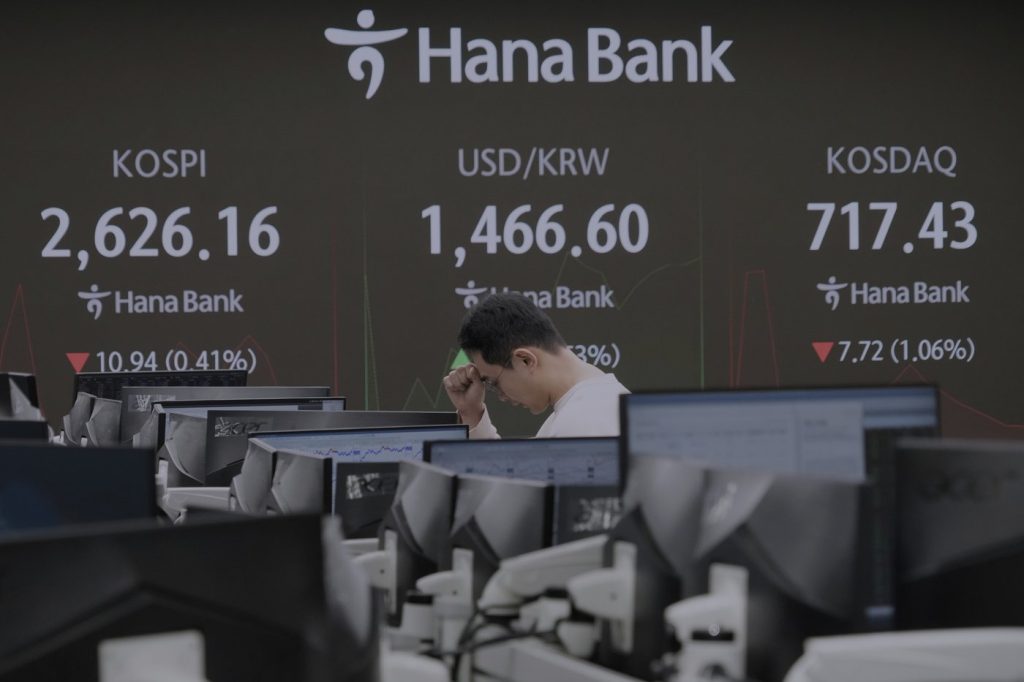Asian shares experienced a mostly negative trend on Monday, following a slight boost in U.S. technology stocks that helped Wall Street end a four-week losing streak. Investors are currently focused on developments surrounding U.S. President Donald Trump's proposed tariffs, which may be refined to target nations with significant trade surpluses with the United States, many of which are in Asia.
President Trump has established an April 2 deadline for the implementation of additional tariffs on trading partners. This comes after a history of postponed deadlines for tariffs, sometimes occurring at the last minute.
During a meeting with business leaders and U.S. Senator Steve Daines, who is an ardent supporter of Trump and the first member of Congress to visit Beijing since Trump took office in January, Chinese Premier Li Qiang expressed a conciliatory approach. Li emphasized the need for dialogue over confrontation and advocated for cooperation that benefits both sides, noting that the relationship between China and the U.S. has reached a crucial point.
The meeting included executives from several major American companies, such as FedEx Corp. CEO Raj Subramaniam, Boeing’s senior vice president Brendan Nelson, and Qualcomm’s CEO Cristiano Amon, among others. Junrong Yeap of IG commented that Trump administration officials indicated the list of countries affected by tariffs may not be comprehensive, leading to an evolving sense of optimism that Trump's tariff plans might be more show than substance.
Despite hopes of a more tempered approach to tariffs, Chinese markets continued to reflect a downward trend. The Hang Seng Index in Hong Kong decreased by 0.3% to 23,613.50, while the Shanghai Composite Index also fell by 0.3% to 3,356.50. In Japan, the Nikkei 225 remained nearly flat at 37,676.97, following a preliminary manufacturing report indicating the fastest decline in output in a year. Meanwhile, Taiwan’s Taiex recorded a slight increase of 0.1%.
On the previous Friday, the S&P 500 rose by 0.1% to 5,667.56, marking a weekly gain of 0.5%, although it remains down by 4.8% for the month. The Dow Jones Industrial Average also posted a modest increase of 0.1%, finishing at 41,985.35, while the Nasdaq composite saw a more significant rise of 0.5%, ending at 17,784.05. Technology stocks played a substantial role in offsetting declines within the S&P 500, recovering from prior sell-offs related to broader market sentiment.
Notable fluctuations were seen in Big Tech stocks, with Apple increasing by approximately 2% and Microsoft by 1.1%. In contrast, Nvidia experienced a drop of 0.7%, and Micron Technology saw the largest decline among S&P 500 stocks, plunging by 8%. This recent market volatility has been largely driven by uncertainties regarding the U.S. economy, especially amidst a looming trade war that poses risks to inflation and potential harm to consumers and businesses alike.
With inflation persisting above the Federal Reserve’s target goal of 2%, there are concerns that tariffs may hinder efforts to control inflation rates. Recent economic reports on home sales, industrial production, and unemployment suggested that the economy is maintaining strength; however, indications of consumers becoming more cautious are evident in reports on consumer sentiment and retail sales.
Additionally, businesses have begun expressing worries regarding the implications of tariffs and inflation on their operating costs. Homebuilder Lennar, for instance, saw its shares decline by 4% after providing a disappointing forecast for new orders and average sales prices for the current quarter, attributed to high interest rates, inflation, and declining consumer confidence negatively affecting the housing market.
In early Monday trading, U.S. benchmark crude oil saw a decrease of 22 cents to $68.06 per barrel in electronic trading on the New York Mercantile Exchange, while Brent crude, the international standard, fell by 30 cents to $71.86 per barrel. The U.S. dollar strengthened against the Japanese yen, rising to 149.78 yen from 149.37 yen, and the euro slightly increased to $1.0823 from $1.0816.










